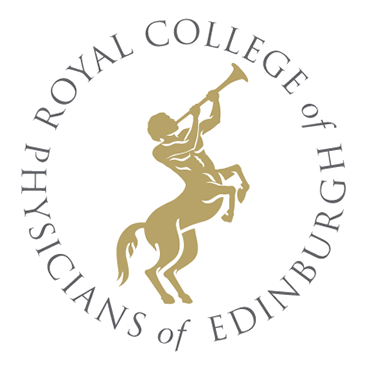
The Consultation Letters of Dr William Cullen (1710-1790) at the Royal College of Physicians of Edinburgh
[ID:2233] From: Dr Alexander Taylor (Sanders) / To: Dr William Cullen (Professor Cullen) / Regarding: Reverend Colin Gillies (of Paisley) (Patient), Miss (Patient) / 12 June 1782 / (Incoming)
Letter from Alexander Taylor, briefly noting that Mr Gillies is taking his medicines, and giving an account of the death and autopsy (post mortem) examination of a 22-year-old woman, a 'strong-made girl and of a chearful temper', whose disease 'had all the marks of the Angina Pectoris'. She had suffered from chest pains and faintness. He attributes her collapse to having been startled by a firework display, probably staged to celebrate Admiral Rodney's victory in the Battle of the Saintes, but her post mortem (by Taylor, Fulton and White) revealed carditis.
- Facsimile
- Normalized Text
- Diplomatic Text
- Metadata
- Case
- People
- Places
Facsimile
There are 4 images for this document.
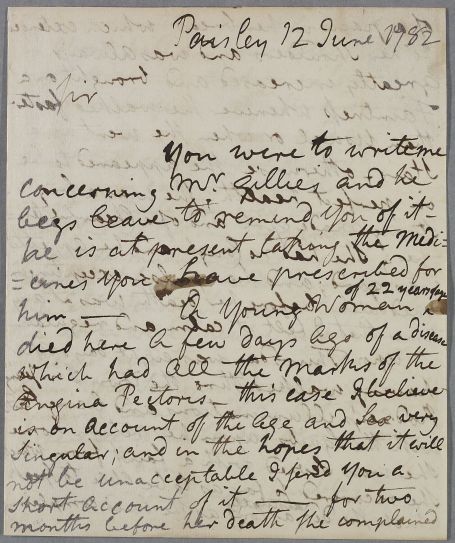
[Page 1]
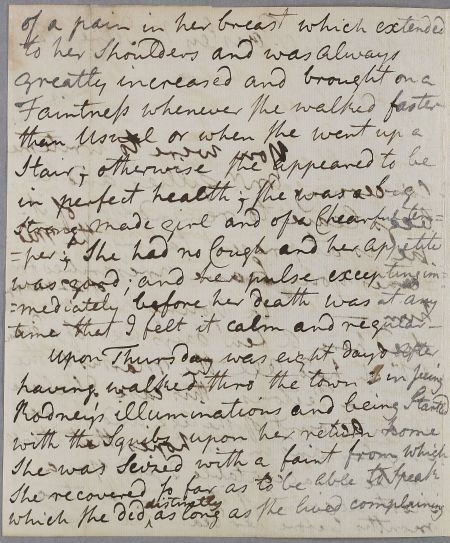
[Page 2]
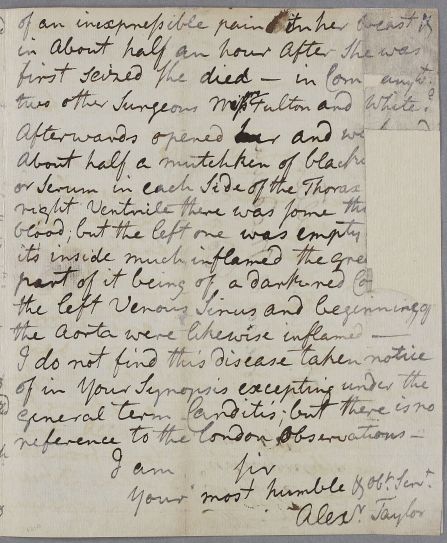
[Page 3]
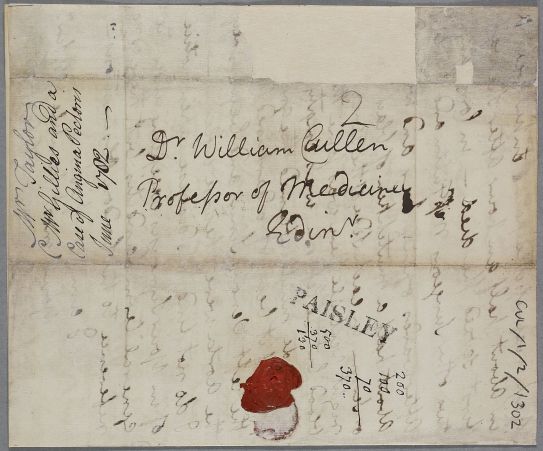
[Page 4]
Metadata
| Field | Data |
|---|---|
| DOC ID | 2233 |
| RCPE Catalogue Number | CUL/1/2/1302 |
| Main Language | English |
| Document Direction | Incoming |
| Date | 12 June 1782 |
| Annotation | None |
| Type | Authorial original |
| Enclosure(s) | No enclosure(s) |
| Autopsy | Yes |
| Recipe | No |
| Regimen | No |
| Letter of Introduction | No |
| Case Note | No |
| Summary | Letter from Alexander Taylor, briefly noting that Mr Gillies is taking his medicines, and giving an account of the death and autopsy (post mortem) examination of a 22-year-old woman, a 'strong-made girl and of a chearful temper', whose disease 'had all the marks of the Angina Pectoris'. She had suffered from chest pains and faintness. He attributes her collapse to having been startled by a firework display, probably staged to celebrate Admiral Rodney's victory in the Battle of the Saintes, but her post mortem (by Taylor, Fulton and White) revealed carditis. |
| Manuscript Incomplete? | No |
| Evidence of Commercial Posting | Yes |
Case
Cases that this document belongs to:
| Case ID | Description | Num Docs |
|---|---|---|
| [Case ID:1286] |
Case of the Rev. Colin Gillies who has suffered several fainting fits almost like epileptic seizures. |
7 |
| [Case ID:2136] |
Case of an unnamed twenty-two year old woman who dies after being startled at a firework display. |
1 |
People linked to this document
| Person ID | Role in document | Person |
|---|---|---|
| [PERS ID:207] | Author | Dr Alexander Taylor (Sanders) |
| [PERS ID:1] | Addressee | Dr William Cullen (Professor Cullen) |
| [PERS ID:1465] | Patient | Reverend Colin Gillies (of Paisley) |
| [PERS ID:1902] | Patient | Miss |
| [PERS ID:2999] | Patient's Physician / Surgeon / Apothecary | Mr Fulton |
| [PERS ID:1] | Patient's Physician / Surgeon / Apothecary | Dr William Cullen (Professor Cullen) |
| [PERS ID:3000] | Patient's Physician / Surgeon / Apothecary | Mr John White (Whytt) |
| [PERS ID:207] | Patient's Physician / Surgeon / Apothecary | Dr Alexander Taylor (Sanders) |
| [PERS ID:2656] | Other | Admiral George Brydges Rodney (Admiral Rodney, 1st Baron Rodney) |
Places linked to this document
| Role in document | Specific Place | Settlements / Areas | Region | Country | Global Region | Confidence |
|---|---|---|---|---|---|---|
| Place of Writing | Paisley | Glasgow and West | Scotland | Europe | certain | |
| Destination of Letter | Edinburgh | Edinburgh and East | Scotland | Europe | certain | |
| Place of Handstamp | Paisley | Glasgow and West | Scotland | Europe | certain |
Normalized Text
You were to write me
concerning Mr. Gillies and he
begs leave to remind you of it.
He is at present taking the Medi¬
cines you have prescribed for
him –– A young woman ↑of 22 years of age↑
died here a few days ago of a disease
which had all the marks of the
Angina Pectoris – this case I believe
is on account of the age and sex very
singular; and in the hopes that it will
not be unacceptable I send you a
short account of it –––– for two
months before her death she complained
[Page 2]
of a pain in her breast which extended
to her shoulders and was always
greatly increased and brought on a
Faintness whenever she walked faster
than usual or when she went up a
stair; otherwise she appeared to be
in perfect health; she was a big
strong-made girl and of a chearful tem¬
per; she had no cough and her appetite
was good; and her pulse was at any
time that I felt it calm and regular –
Upon Thursday was eight days after
having walked thro the town & in seeing
Rodney's illuminations 1 and being startled
with the squibs upon her return home
she was seized with a faint from which
she recovered so far as to be able to speak
which she did ↑distinctly↑ as long as she lived complaining
[Page 3]
of an inexpressible pain in her breast &
in about half an hour after she was
first seized she died –– In Com[p]any with
two other Surgeons Messrs Fulton and White I
afterwards opened her and we [found]
about half a mutchkin of black {illeg}
or serum in each side of the Thorax {illeg}
right Ventricle there was some thi{illeg}
blood, but the left one was empty {illeg}
its inside much inflamed the grea[ter]
part of it being of a dark red co[lour]
the left Venous Sinus and beginning of
the Aorta were likewise inflamed ––
I do not find this disease taken notice
of in your Synopsis 2 excepting under the
general term Carditis; but there is no
reference to the London observations 3 –
your most humble & obedient servant
[Page 4]
Dr. William Cullen
Professor of Medicine
Edinburgh
Mr Taylor
C Mr Gillies and a
Case of Angina Pectoris
June 1782. ––
Notes:
1: The rest of the letter indicates that this was some sort of firework display. The most likely context is a celebration of Admiral George Rodney's recent victory in the Battle of the Saintes (though it is to be noted that Lord Paisley was created Baron Rodney in 1782).
2: See William Cullen, Synopsis nosologiæ methodicæ (Edinburgh: 1769), p. 261.
3: Evidently a reference to some medical observations made or appearing at London, but precise source untraced.
Diplomatic Text
You were to write me
concerning Mr. Gillies and he
begs leave to remind you of it.
He is at present taking the Medi¬
cines you have prescribed for
him –– A young woman ↑of 22 years of age↑
died here a few days ago of a disease
which had all the marks of the
Angina Pectoris – this case I believe
is on account of the age and sex very
singular; and in the hopes that it will
not be unacceptable I send you a
short account of it –––– for two
months before her death she complained
[Page 2]
of a pain in her breast which extended
to her shoulders and was always
greatly increased and brought on a
Faintness whenever she walked faster
than usual or when she went up a
stair; otherwise she appeared to be
in perfect health; she was a big
strong-made girl and of a chearful tem¬
per; she had no cough and her appetite
was good; and her pulse was at any
time that I felt it calm and regular –
Upon Thursday was eight days after
having walked thro the town & in seeing
Rodney's illuminations 1 and being startled
with the squibs upon her return home
she was seized with a faint from which
she recovered so far as to be able to speak
which she did ↑distinctly↑ as long as she lived complaining
[Page 3]
of an inexpressible pain in her breast &
in about half an hour after she was
first seized she died –– In Com[p]any wt.
two other Surgeons Messrs Fulton and White I
afterwards opened her and we [found]
about half a mutchkin of black {illeg}
or serum in each side of the Thorax {illeg}
right Ventricle there was some thi{illeg}
blood, but the left one was empty {illeg}
its inside much inflamed the grea[ter]
part of it being of a dark red co[lour]
the left Venous Sinus and beginning of
the Aorta were likewise inflamed ––
I do not find this disease taken notice
of in your Synopsis 2 excepting under the
general term Carditis; but there is no
reference to the London observations 3 –
your most humble & obt.servt.
[Page 4]
Dr. William Cullen
Professor of Medicine
Edinr.
Mr Taylor
C Mr Gillies and a
Case of Angina Pectoris
June 1782. ––
Notes:
1: The rest of the letter indicates that this was some sort of firework display. The most likely context is a celebration of Admiral George Rodney's recent victory in the Battle of the Saintes (though it is to be noted that Lord Paisley was created Baron Rodney in 1782).
2: See William Cullen, Synopsis nosologiæ methodicæ (Edinburgh: 1769), p. 261.
3: Evidently a reference to some medical observations made or appearing at London, but precise source untraced.
XML
XML file not yet available.
Feedback
Send us specfic feeback about this document [DOC ID:2233]
Please note that the Cullen Project team have now disbanded but your comments will be logged in our system and we will look at them one day...

